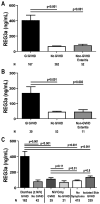Have we made progress in the treatment of GVHD?
- PMID: 23200544
- PMCID: PMC3513691
- DOI: 10.1016/j.beha.2012.10.010
Have we made progress in the treatment of GVHD?
Abstract
One reason for the lack of progress in the treatment of acute graft versus host disease (GVHD) is the lack of reliable biomarkers. GVHD of the gastrointestinal (GI) tract is closely associated with non-relapse mortality (NRM) following hematopoietic cell transplantation (HCT). Using an unbiased, large-scale, quantitative proteomic discovery approach, we identified candidate biomarkers that were increased in plasma from HCT patients with GI GVHD. We then validated the lead candidate, REG3α, by ELISA in samples from more than 1000 HCT patients from three transplant centers. Plasma REG3α concentrations were 3-fold higher in patients at GI GVHD onset than in all other patients. REG3α concentrations correlated most closely with lower GI GVHD at GVHD onset and predicted response to therapy at 4 weeks, 1-year NRM, and 1-year survival (P ≤ 0.001). Multivariate analysis showed that advanced clinical stage, severe histologic damage, and high REG3α concentrations at the diagnosis of GVHD independently predicted 1-year NRM, which progressively increased with higher numbers of onset risk factors present. We conclude that REG3α is a plasma biomarker of GI GVHD that can be combined with clinical stage and histologic grade to improve risk stratification of patients, perhaps providing a platform for advances in the treatment of high-risk GVHD.
Copyright © 2012 Elsevier Ltd. All rights reserved.
Conflict of interest statement
No relevant financial relationships with any commercial interest.
Figures



References
-
- Pasquini MC, Wang Z. Current use and outcome of hematopoietic stem cell transplantation: CIBMTR summary slides. 2011
-
- Mowat A, Socie G. Intestinal graft-vs-host disease. In: Ferrara JLM, Cooke KR, Deeg HJ, editors. Graft-vs-host disease. New York: Marcel Dekker; 2004. pp. 279–327.
-
- Martin PJ, McDonald GB, Sanders JE, Anasetti C, Appelbaum FR, Deeg HJ, et al. Increasingly frequent diagnosis of acute gastrointestinal graft-versus-host disease after allogeneic hematopoietic cell transplantation. Biol Blood Marrow Transplant. 2004;10:320–327. - PubMed
-
- MacMillan ML, Weisdorf DJ, Wagner JE, DeFor TE, Burns LJ, Ramsay NK, et al. Response of 443 patients to steroids as primary therapy for acute graft-versus-host disease: comparison of grading systems. Biol Blood Marrow Transplant. 2002;8:387–394. - PubMed
Publication types
MeSH terms
Substances
Grants and funding
LinkOut - more resources
Full Text Sources
Other Literature Sources
Medical

